- Home
- Peter Lerangis
Antarctica Escape from Disaster
Antarctica Escape from Disaster Read online
Antarctica
Escape from Disaster
Peter Lerangis
For David Levithan
Contents
Part One Trapped
1 Andrew
2 Colin
3 Philip
4 Jack
5 Colin
Part Two Alone
6 Andrew
7 Colin
8 Philip
9 Jack
Part Three Launch
10 Colin
11 Andrew
12 Jack
Part Four Separation
13 Barth
14 Colin
15 Andrew
16 Jack
17 Andrew
18 Philip
19 Andrew
20 Philip
Part Five Desperation
21 Jack
22 Nigel
23 Colin
24 Andrew
25 Jack
26 Andrew
27 Jack
28 Andrew
Part Six Home
29 Colin
The Aftermath
Historical Notes
A Biography of Peter Lerangis
Glossary
Bibliography
Acknowledgments
Crew and company of the Mystery, as of January 10, 1910:
Jack Winslow — expedition leader
Elias Barth — captain
Peter Mansfield — second in command and chief navigator
Colin Winslow — third in command
John Siegal— first mate
Luis Rivera — second mate
Andrew Douglas Winslow — junior officer
Dr. Ross Montfort — general physician
Dr. Harold Riesman — veterinarian
Dr. Frank Nesbit — biologist
Harv Talmadge— meteorologist
Jacques Petard — physical instructor and chaplain
David Ruskey— photographer
Kosta Kontonikolaos— dog handler
Sam Bailey, Pete Hayes, Vincent Lombardo, Mike Sanders, Chris Ruppenthal, Bruce Cranston, George Oppenheim, James Windham, Robert (last name unknown) — able seamen
Tim O’Malley — able seaman/second cook
Hank Brillman— electrician
Wyman Kennedy — carpenter
Horst Flummerfelt— machinist
Rick Stimson — cook
Philip Westfall — helpmeet at large
Nigel (last name unknown) — stowaway
Chionni, Demosthenes, Dimitriou, Eleni, Fotis, Iosif, Herd, Kalliope, Kristina, Maria, Martha, Megalamatia, Michalaki, Nikola, Panagiotis, Pericles, Plutarchos, Socrates, Sounion, Stavros, Yiorgos, Zeus — dogs
Deceased:
Dr. David Shreve — geologist (fell into
crevasse, November 20, 1909, during
sledge journey toward South Pole)
Thirteen dogs: Aspros, Galactobouriko, Hera, Hercules, Kukla, Loukoumada, Plato, Skylaki, Taki, Taso (with Shreve); Tsitsifies, Vrechi, Yanni (of dysentery)
Part One
Trapped
1
Andrew
ANDREW PUT DOWN his pencil. Blood oozed from the broken, coal-black skin on his index finger and dripped onto the page. He lay back and let the notebook fall open on his chest. The cut throbbed, sharp and unrelenting. All his sores did— on his hands, wrists, face, feet.
The Mystery’s afterhold had become a makeshift hospital. The entire South Pole crew had required treatment upon returning, but now only Kosta, Lombardo, Oppenheim, and Andrew remained belowdecks.
Outside, the crew pounded on the ice that trapped the ship. Captain Barth’s voice was clear through four feet of hull: “Put your weight into it, men!”
Andrew wanted to rise up and help — step outside, grip an ax in his frostbitten palms, and hack with the best of them. He was different now. The trip across the continent had changed him. He wasn’t the kid they thought he was: the expedition leader’s stepson. A dreamer. A bookworm. A sixteen-year-old landlubber playing sailor.
But he couldn’t very well prove it in the after-hold.
Andrew had learned the unspoken lessons of the sailors. Every day was a battle — position and planning, strategy and tactics. Life was about survival. Using the enemy’s strength to your advantage. Trimming your sails against a strong head wind, lowering them before a storm. Finding shelter under a pressure ridge and warmth in a cave of solid ice. Learning never to repeat your mistakes.
Andrew had fought his battle and lost. He had collapsed leading a dog sledge across the continent, with no reliable navigation and a partner who could neither speak English nor walk.
The sledge had traveled onward without him, 200 yards before reaching the Mystery. If his stepbrother, Colin, hadn’t found him, Andrew would have frozen, his body preserved forever in an ice cap that would push northward and eventually send him, encased in an iceberg, out to sea.
Andrew was grateful to Colin. Everyone was.
Colin had foiled Nigel and Philip’s mutiny. The crew respected Colin. We knew he had it in him, they all said; he was just waiting for the right opportunity.
But they weren’t saying that before November. Colin had been a thorn in everyone’s side, surly and lazy. He’d been against this trip from the beginning. He felt it was wrong to leave New York so soon after his stepmother had died. It showed that Jack was obsessed and coldhearted.
But Colin hadn’t seen the truth, as Andrew had. Mother would have said go. Better to roll up your sleeves and follow your dream instead of moping while it faded away.
But what happened when you followed the dream and failed — when a glorious quest ended in mishaps, bad judgment, death, and disaster?
You bled. Your body suffered hypothermia and starvation. You were bedridden with the lame, the weak, and the crazy. You had everyone’s sympathy.
You didn’t have respect.
Andrew swung his legs around. The mission may have failed, but he would get the respect he deserved. He wouldn’t let them treat him as if he were a child. A child couldn’t revive an entire expedition when its members had nearly frozen to death in a cave. A child didn’t save the life of a man determined to die, the way Andrew had when Kosta insisted he be left to freeze with his dogs.
A child didn’t sit and stew when there was work to be done.
Holding tight to the wooden bunk frame, Andrew eased himself off the bedding. The last time he’d tried to walk, three days ago, he couldn’t support his own weight.
His feet hit the deck solidly. Slowly he released his fingers from the frame. His knees did not buckle. He walked in a circle, testing his leg muscles. Painful, but not excruciating. He felt a little dizzy, but that was to be expected. His belly, around which he’d had to cinch his trouser waist with a rope, now felt a bit flabby, if that was possible.
His ankles still had open sores, and his hands and face stung. But cuts didn’t kill. Quickly he put on three pairs of socks, then slipped on his boots, parka, and hat. He wrapped clean bandages around his hands before putting on gloves.
“Andreou, fìlos mou,” Kosta said, “pou pas?”
Andrew recognized that expression. Where are you going?
“Epàno,” Andrew replied. Up.
“Etsi bravo!” Kosta cheered Andrew’s vocabulary but his expression instantly turned to dismay, and he protested in a rapid staccato of words that Andrew neither understood nor obeyed as he climbed abovedecks.
The sunlight’s glare hurt more than the cold. Andrew pulled a pair of goggles from his pocket and put them on. The straps felt like metal files.
The ship’s dogs scampered outside their kennels, which lined both port and starboard sides,
crowding the deck. There were only twenty-two of the original thirty-five; six had been lost on the journey to the South Pole, seven more on the retreat. The survivors were beginning to gain weight now, and as Andrew hobbled across the deck they fought over penguin pemmican and scraps of seal meat.
He cautiously climbed onto one of the port kennels, then hoisted his legs over the gunwale.
The scene was worse than he’d expected. Ice surrounded the Mystery on all sides. Two floes had converged on her, one pushing at port, the other at starboard. The term for this was pressure, which was like calling dynamite a candle. This kind of thing happened all the time in Antarctica. With nowhere to go, two colliding ice floes would shove each other’s edges upward, groaning like a wounded sea god. Eventually one side would win, pushing over the top of the other, smashing the dented ice into a broken, mountainous heap, a pressure ridge.
Andrew could see that the portside floe was pushing on the ship, the starboard-side floe was pushing down.
The Mystery itself was a pressure ridge.
Colin and Jack hacked at the ice around the prow. Mansfield, the second in command, pulled a giant saw through the ice that encroached on the port hull. Even the prisoners had been let out to help — which made sense, since escape was hardly a danger. Nigel, the stowaway who had led the mutiny, was using a mallet, striking a wedged chisel with insane fury, trying to dislodge the ice.
As Andrew slowly made his way down the gangplank, the men were too obsessed to notice him — except Philip Westfall.
“Well. The return of the prodigal son.” Philip leaned on a large shovel. He was bundled in a thick overcoat covered with a canvas tarpaulin. The dry pallor of his face contrasted starkly with the sweaty ruddiness of the men around him.
“Are you using that shovel, Philip?” Andrew asked.
“Does it look as if I am?” Philip said. “Of course I am. It is my prop. It keeps me from lying down, a condition I desire madly but dare not assume, under penalty of death, no doubt.”
The brig hadn’t changed Philip. He had fit in among the crew about as well as a poodle among oxen — a seventeen-year-old rich boy who had tried to pass himself off as a twenty-one-year-old sailor. He was on the voyage only because he was the nephew of Horace Putney.
Putney had financed the entire expedition. He was stinking rich (less polite people would leave out the word “rich”). Jack would never say exactly how Putney had made his money, which meant it couldn’t have been legal. But when none of Jack’s wealthy old Harvard pals would commit a dime toward the undertaking, Jack went to Putney, and Putney ponied up. All he wanted in return was a share of the glory after the ship arrived home — and to be rid of his nephew, whom his sister had sent from London to live with him.
“I don’t suppose I can use your prop to do a little work?” Andrew asked.
Philip handed it over. “As long as you promise to agree when I claim that you wrenched it from my grasp against my will.”
Andrew took the shovel and walked toward the Mystery’s hull. Out of the corner of his eye he saw Colin staring at him. Andrew smiled weakly.
A group of men had managed to drive a crack in the ice parallel to the hull. Captain Barth was among them. He looked warily at Andrew. “You know, you don’t have to do this, Winslow.”
“I want to,” Andrew said.
Barth grunted approvingly. “We’re making good progress. Should break through by the end of the day. Stay on this side and help. Gravity will help pull her down and that’ll wrench up the starboard side and bust her loose.”
Andrew looked toward the horizon for streams that led through the ice. “Any leads?”
“There’s a water sky north-by-northwest. Ruskey reported seeing some leads before it, about half a mile away. I have a team clearing the prow. When we’re in the clear, we’ll charge up the engine and use the hull as a battering ram through the ice. If the wind holds from the south, it may blow the pack out to sea, and we’re home free. But if it shifts …”
Barth let his words trail off, but Andrew knew what he meant. The pack, thousands of sheets of floating ice, was trapped in a sea surrounded on three sides by land. A north wind would push the ice south, jamming it into the Antarctic coast. The leads would close up fast, trapping the Mystery again.
And the wind was changing. Andrew felt it.
As Barth moved away, Andrew slammed his shovel into the crack. It opened a few more inches to the left.
He slammed again and again.
“Attaboy,” someone called, but Andrew wasn’t paying attention. His whole body was working now. The pain was forgotten, and he felt exhilarated. He was hitting just as hard as they were. Harder.
Thrust.
With each smack of the shovel blade, more water peeked through from below.
Thrust.
It wouldn’t be long now. They were going to make it.
Thrust.
Thrust.
Thrust.
On a backstroke the shovel flew out of his hands into the air. Andrew stumbled forward, smashing into the hull.
“Look out!” someone yelled.
The men scattered. The shovel thumped to the ice, narrowly missing Pete Hayes.
Colin ran over to Andrew. “Are you all right?”
Andrew sat, his back against the ship, catching his breath. He had done too much, too fast. “I’m — fine.”
“You have to pace yourself, Andrew.”
“I know … I know. Sorry.”
“When you’re tired and worn out and sick, things like that happen.”
“I’m not sick anymore. I’m trying to help, Colin. You need me out here. You need all the help you can get —”
“Help is the word, yes. Help. If you’re able to provide it, then do the work. If not, then give that shovel to someone who can.”
“Well spoken,” Philip said, briskly marching forward. With a flourish, he scooped the shovel off the ice, then jammed it into the crack. “Take that!”
The ship moved.
All work stopped. One by one, the men dropped their shovels.
“What did I do?” Philip murmured.
“Step back!” Captain Barth shouted. “Now!”
The men turned and ran. Colin pulled Andrew by the arm.
Slowly the massive hull lurched downward. It settled heavily in the sea, sending up a swell that flooded water onto the ice, pushing the tools away from the ship.
A cheer broke out from the starboard side.
The Mystery was out of its trap.
“I don’t believe this,” Andrew said.
Philip stared at his shovel. “Neither do I.”
“Flummerfelt, get to the engine room!” Barth shouted.
“Next port of call, Argentina!” Rivera hooted.
“Home of the best steaks in the world!” O’Malley added, dancing an impromptu jig.
Finally. This was it. The last leg. Buenos Aires and then New York City. Home.
Andrew could feel the sights and sounds of Bond Street — its soot-choked air, its paving stones befouled with horse dung, its constant clamor of passing vagrants and machine noise. It had never seemed more exotic and welcoming.
Jack called out over the din: “Keep hacking, men — we’re not free yet!”
As the water receded, the crewmen scrambled for their picks and axes.
Andrew ran for his shovel. His ankles were killing him now. As he grabbed the handle, the sores on his hands shot pain through his body. He dropped the shovel and let out a yowl.
“Someone grab that shovel!” Barth called out.
A deep moan, like the blast of a trombone, rose up from within the Mystery.
The hull lurched again, but this time toward the men, closing the gap between them and the ship. It jammed against the edge of the ice floe.
CRRACK!
At the sound of splitting timber from the other side of the ship, the crew ran around to starboard.
The center of the starboard hull was cracked, penetrat
ed by a giant column of ice.
2
Colin
January, 10, 1910
“SHE’S STOVE IN,” ANDREW murmured.
“We can see that,” Colin said.
“Translation of stove in?” Philip asked.
“Cracked open,” said Nigel. “Like your head’ll be if you keep asking stupid questions.”
“We may have helped the starboard-side floe by relieving port-side pressure,” Jack said.
Colin struck at the ice column. The other men joined him with renewed force.
Nigel was at his right. “We’ll never cut frew this!”
“Oh, it’s a big boat,” Philip said as he pounded with his shovel. “It’ll survive.”
“Ship, you block’ead, not boat,” Nigel snapped. “And it’s a she,”
“It’s made of wood,” Philip said. “Wood cannot be female.”
“You inherited yer brain from yer pa’s side, then?”
“Nigel, run along and start a mutiny amongst the penguins —”
“Will you knock it off and get to work?” Colin shouted.
The ice was tilted upward at a forty-five-degree angle. It had bent the wooden planking enough to push through the outer layer.
The planks were made of greenheart. Greenheart was like steel, Father had said. And with two feet of solid oak and Norwegian mountain fir behind it, the hull was supposed to be indestructible.
But wood was wood. Under enough pressure greenheart splintered, too.
“Harder! Harder!” Colin yelled, bringing his pick down sharply, sending hunks of ice hurling into the air.
“Hey, John Henry, put down that hammer,” drawled Wyman Kennedy’s voice. “You ’n’ me’s got a job to do.”
Kennedy was the ship’s carpenter, a North Carolinian with a sense of humor so sharp you could scrape paint with it. He was standing behind Colin with Captain Barth and the ship’s machinist, Horst Flummerfelt.
“The hole’s beneath the waterline,” Barth explained. “When the ice gives way, the water’ll pour in.”
“Your pops wants you to help me find some wood and build us a cofferdam to seal off the hull,” Kennedy said. “Let’s go.”
Colin followed Kennedy to the gangplank. They scrambled up the side and over. From the deckhouse, Kennedy began pulling out planks of wood. “It’s got to be watertight,” he said. “No cuttin’ corners.”

 The Orphan
The Orphan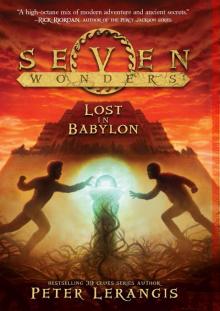 Lost in Babylon
Lost in Babylon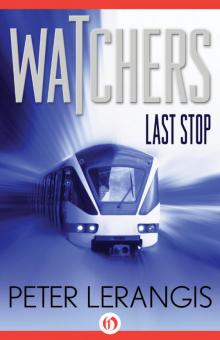 Last Stop
Last Stop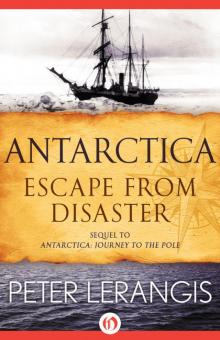 Antarctica Escape from Disaster
Antarctica Escape from Disaster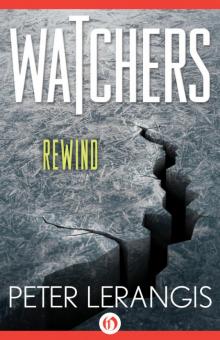 Rewind
Rewind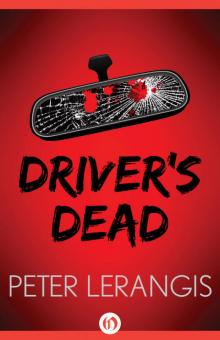 Driver's Dead
Driver's Dead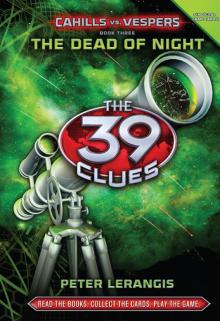 The Dead of Night
The Dead of Night The Promise
The Promise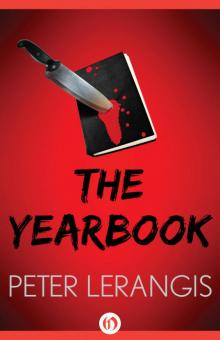 The Yearbook
The Yearbook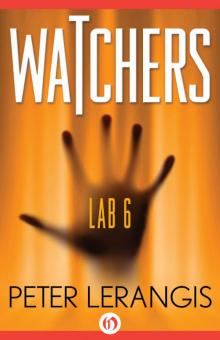 Lab 6
Lab 6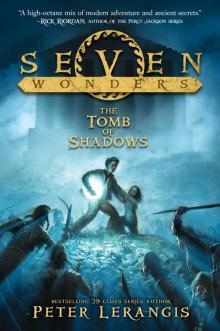 The Tomb of Shadows
The Tomb of Shadows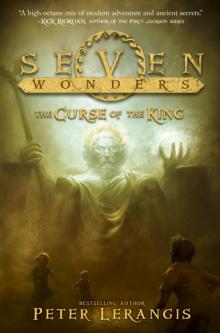 The Curse of the King
The Curse of the King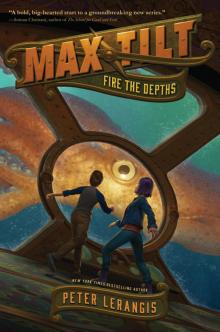 Max Tilt: Fire the Depths
Max Tilt: Fire the Depths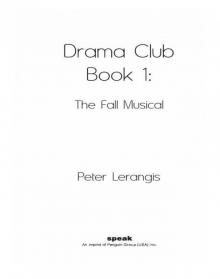 The Fall Musical
The Fall Musical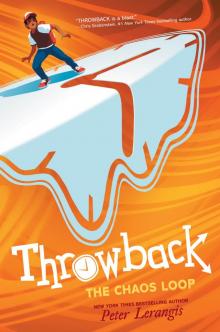 The Chaos Loop
The Chaos Loop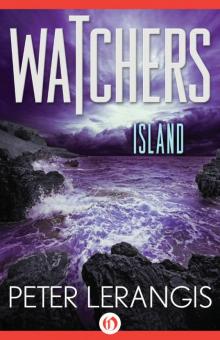 Island
Island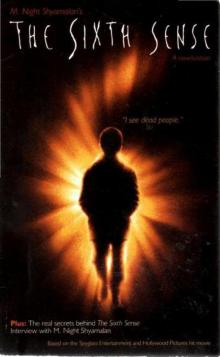 The Sixth Sense
The Sixth Sense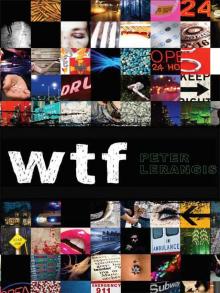 Wtf
Wtf War
War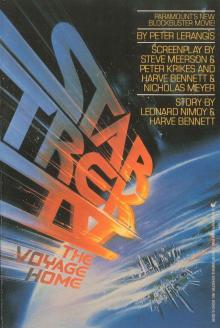 Star Trek IV, the Voyage Home
Star Trek IV, the Voyage Home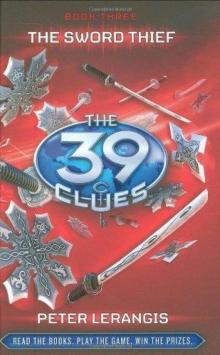 The Sword Thief
The Sword Thief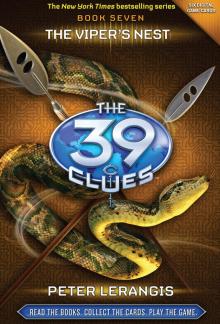 The Viper's Nest
The Viper's Nest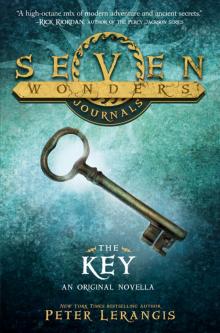 The Select
The Select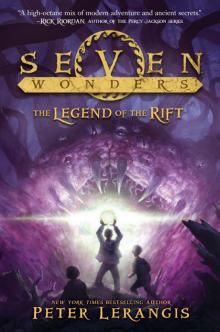 The Legend of the Rift
The Legend of the Rift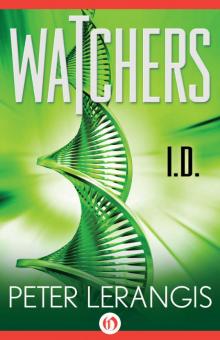 I.D.
I.D. The Sword Thief - 39 Clues 03
The Sword Thief - 39 Clues 03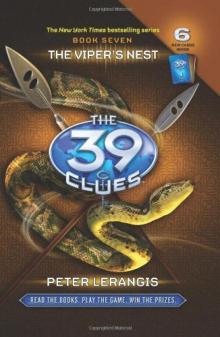 The 39 Clues Book 7: The Viper's Nest
The 39 Clues Book 7: The Viper's Nest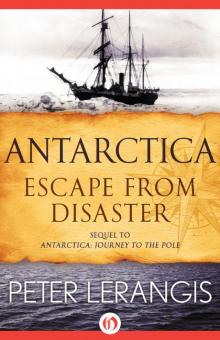 Antarctica
Antarctica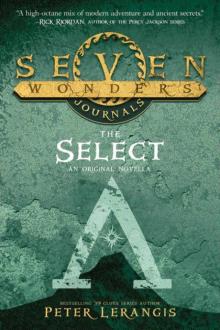 Seven Wonders Journals: The Select
Seven Wonders Journals: The Select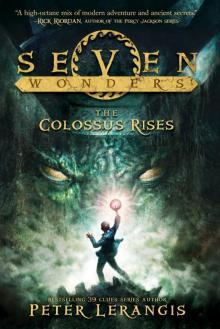 Seven Wonders Book 1: The Colossus Rises
Seven Wonders Book 1: The Colossus Rises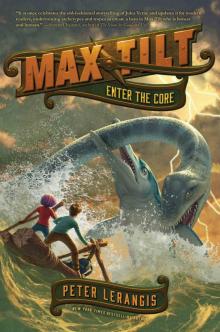 Enter the Core
Enter the Core![39 Clues _ Cahills vs. Vespers [03] The Dead of Night Read online](http://i1.bookreadfree.com/i1/04/02/39_clues_cahills_vs_vespers_03_the_dead_of_night_preview.jpg) 39 Clues _ Cahills vs. Vespers [03] The Dead of Night
39 Clues _ Cahills vs. Vespers [03] The Dead of Night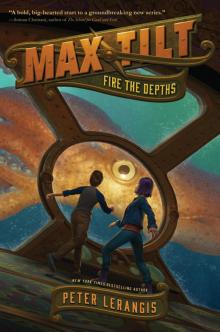 Fire the Depths
Fire the Depths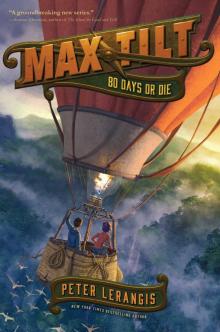 80 Days or Die
80 Days or Die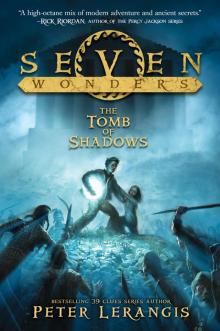 Seven Wonders Book 3
Seven Wonders Book 3